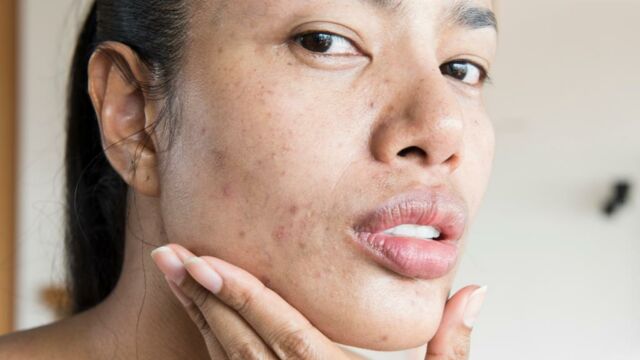Skin positivity: What is this movement and how to practice it daily

The skin positivity movement has been making waves in the last few years, but what exactly does it entail and how does one go about practicing it?
With social media being such a dominant presence in everyone’s life, it’s hard to avoid the countless beauty ads and models with seemingly perfect skin. And as you would expect, being exposed to this type of content all the time doesn’t come without consequence—it leads people to believe there is a certain mold they must fit in order to be deemed 'beautiful' or 'worthy.'
Discover our latest podcast
Thankfully, many people have begun spearheading the skin positivity movement in the simplest form of protest there is—ignoring society’s beauty standards and showing themselves without makeup, without filters, and with absolute vulnerability. Recently, the movement has gained a lot of traction, and many companies, celebrities, and influencers have started embracing it, as well.
More under this adMore under this adWhat is skin positivity?
Skin positivity is simply the belief that all skin types are worthy of being celebrated, regardless of the negative stigma surrounding blemishes. It is the belief that everyone should be allowed to celebrate and embrace their skin, whether it be someone with acne, scarring, or any other type of skin condition.
This type of movement allows people to show themselves off without the fear of judgement. As a result, more people feel empowered to embrace their natural appearances, which will eventually lead to the normalization of different skin types and how they’re represented in media.
More under this adMore under this ad
A brief history
Unsurprisingly, the skin positivity movement is a relatively new one. In the media, acne and other skin conditions have almost exclusively been used on characters intended to be unattractive and 'gross.' For some media, this is still true. However, once body positivity became mainstream, people took on a new battle—skin inclusivity—and flipped the narrative on its head. With the rise of social media and the use of hashtags, it wasn’t long before #skinpositivity took off and it became a trend to post your natural skin. Similarly, the hashtag #freethepimple went mainstream in 2015.
More under this adMore under this adSoon after, many celebrities and influencers followed suit, which has had a profound impact on many. Without respectful representation and the constant pressure to fit unrealistic beauty standards, people with skin conditions have often found it difficult to relate to these celebrities, as they often perpetuate these unattainable standards themselves. When public figures are candid about their physical appearances, imperfections become far more acceptable in society’s eyes.
Where are we now?
Major changes in the beauty industry have occurred thanks to this powerful movement. Brands like Starface and Truly Beauty have come out with cute and stylish 'zit stickers' in order to destigmatize acne and skincare. Some of the biggest makeup and skincare brands have committed to no longer photoshopping the appearance of the model’s skin, like Glossier and Milk Makeup. Many beauty influencers have built their platforms entirely on the basis of skin acceptance, which has helped people adopt a non-judgemental mindset.
More under this adMore under this adIn fact, there are hundreds of accounts dedicated solely to celebrating people with acne or other skin conditions. While there is still a long way to go, society is on the right track to eliminating the shame surrounding blemishes.

Key Figures
To show solidarity in the movement, many celebrities and influencers are turning to social media to share their stories and photos. Keke Palmer made headlines in 2020 when she revealed her ongoing battle with polycystic ovary syndrome (PCOS) and included photographs of her natural skin.
EmeraldxBeauty, real name Kadeeja Sel Khan, is a beauty influencer known worldwide for her skin positivity. Since the beginning of her career, she has been transparent about her natural skin despite her often-glamorous looks. While Khan is often met with criticism, she continues to create content to help others feel more comfortable in their own skin.
More under this adMore under this adOther celebrities, such as Lili Reinhart, Justin Bieber, Kendall Jenner, and Lorde, have all spoken out in support of skin positivity—Bieber even declared 'Pimples are in' to hundreds of millions of people on an Instagram post that showed his unedited skin.

How do I practice skin positivity?
Accepting your blemishes is something easier said than done, especially since society grooms us into believing there is an 'ideal skin type' that needs to be achieved. That’s why the first step of getting involved with the skin positivity movement is to practice appreciating your own skin, despite what you’ve been programmed to believe. So how do you do that?
- Radical acceptance of the truth—every human is different, especially when it comes to physical appearance. There are so many factors that affect skin, such as stress, genetics, and hormone imbalances, that are simply unavoidable. Once you are able to accept this, you can begin to understand why there is no point in judging and comparing your skin type to others.
- Treat your skin the way it should be treated. Practicing the right type of skincare will leave you feeling confident and healthy, which will translate into you feeling far more comfortable in your skin. Changing your mindset from 'I need to get rid of my blemishes' to 'I am doing this to take care of myself' can really alter your perspective on skincare.
- Follow positive figures in the movement. Some accounts that spread endless positivity include: @lounorthcote, @freethepimple_, and @emeraldxbeauty. Adding some skin positivity to your social media feeds can help with self-confidence, while also supporting the normalization of all types of skin.